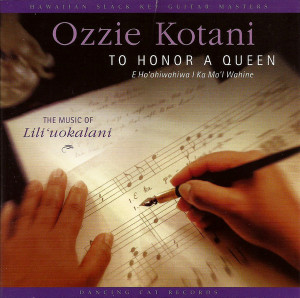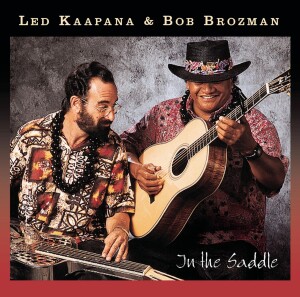 Legend has it that Spanish and Mexican cowboys brought acoustic guitars to the Hawaiian Islands in the 1800s. The native Hawaiians acquired some of these guitars and developed uniquely inventive techniques for playing them. Influenced by their own traditional chants and also by the European hymnals provided by generations of Christian missionaries, a generic “Hawaiian” sound was created.
Legend has it that Spanish and Mexican cowboys brought acoustic guitars to the Hawaiian Islands in the 1800s. The native Hawaiians acquired some of these guitars and developed uniquely inventive techniques for playing them. Influenced by their own traditional chants and also by the European hymnals provided by generations of Christian missionaries, a generic “Hawaiian” sound was created.
There are two distinct styles of guitar playing found in Hawaii; ki ho’alu (or slack key) and kika kila (steel guitar). Both forms depend on open tunings, that is tuning the strings to an open chord rather than Spanish tuning which requires the player to form chords. Steel guitars are fretted with a metal object, a bar or tube, which when moved up and down the strings creates the melody by a series of sliding movements. Slack key uses a more traditional picking style and sounds much like acoustic guitar picking in the folk style. Both forms rely on melody and ringing notes to create a sonic image of warm breezes, sunshine and palm trees. The two albums on hand are superb examples of both Hawaiian styles, and yet only scratch the surface of the richness of this music.
Lili’uokalani was Queen of Hawaii, assuming the throne in 1891. It was a troubled time and her reign was fraught with rebellion and stress. She had been educated at the Chiefs’ Children’s School, and displayed outstanding abilities as a musician. Lili’oukalani played guitar, piano, organ, ukulele and zither, sang alto and performed Hawaiian and English secular and sacred music. Her compositions are legendary in Hawaii and Ozzie Kotani’s remarkable tribute shows why. Her songs are melodic masterpieces, beautifully constructed, and Ozzie plays them exquisitely.
To Honor a Queen is an album of solo guitar music. All instrumental, nothing gets between the listener and this marvellous music. George Winston’s sympathetic production places the guitar front and centre. It sounds as though Ozzie is in the same room with you. He uses a steel string guitar for some and a nylon string guitar for others. The notes ring clear and strong from either one. Queen Lili’uokalani’s melodies are his pre-eminent concern, and Kotani’s love and respect for the songs is evident throughout this beautiful collection of guitar music. The titles are all in Hawaiian, and would mean very little to listeners unfamiliar with the Queen’s oeuvre, but almost everyone has heard “Aloha ‘oe” which is a standout track.
(Dancing Cat Records, 2002)
 The second album is a recording of duets by two supremely gifted guitarists. Bob Brozman has spent the last three years touring the US, Canada, Japan, and Europe. He plays in more styles than anyone I’ve ever heard, and fits in comfortably whether playing blues, roots music, Okinawan sanshin or Indian or African traditional music. He is truly a master of the steel guitar. Led Kaapana is a slack key legend. He is also a wizard on the ukulele. His 1998 solo album Waltz of the Wind continues to enchant, and has a regular place in my play list.
The second album is a recording of duets by two supremely gifted guitarists. Bob Brozman has spent the last three years touring the US, Canada, Japan, and Europe. He plays in more styles than anyone I’ve ever heard, and fits in comfortably whether playing blues, roots music, Okinawan sanshin or Indian or African traditional music. He is truly a master of the steel guitar. Led Kaapana is a slack key legend. He is also a wizard on the ukulele. His 1998 solo album Waltz of the Wind continues to enchant, and has a regular place in my play list.
Together on In the Saddle they make music that is rich and inviting, and conjures up pictures of a different Hawaii. This is not the Honolulu of the 19th century but rather a hopping, busy, contemporary land; influenced by jazz and swing. The first tune, “Ami Ami Slack Key” is a driving duet, the first time Brozman has been recorded playing ki ho’alu and if it is a contest, then the winner is the listener – Whew! Things then settle down with “Bob & Led’s Modern Slack Key” which features Led’s intricate finger-picking on a Santa Cruz Baritone 6-string while Bob slides on a 1927 Weissenborn Hawaiian guitar. The combination of delicate slack key and some haunting steel (this time on a Bear Creek Kona Hawaiian guitar) sets the stage for Kaapana’s vocals on the romantic “Meleana E”. Hawaiian vocal stylings are similar to steel guitar, ranging from guttural glottal stops to a soaring falsetto, and Kaapana is a wonderful singer.
Guitar fans will love the list of specific instruments that are used on this album. The warm, clean production (by Bob Brozman with George Winston) ensures that the instruments sound lovely.
(Dancing Cat Records, 2002)
George Winston’s Dancing Cat Records is dedicated to promoting slack key guitar in the mainland USA and around the world. They feature tours and festivals, and their website provides an in depth history of ki ho’alu guitar playing and its practitioners. This reviewer has not heard a bad album from Dancing Cat and these latest offerings continue the tradition.
